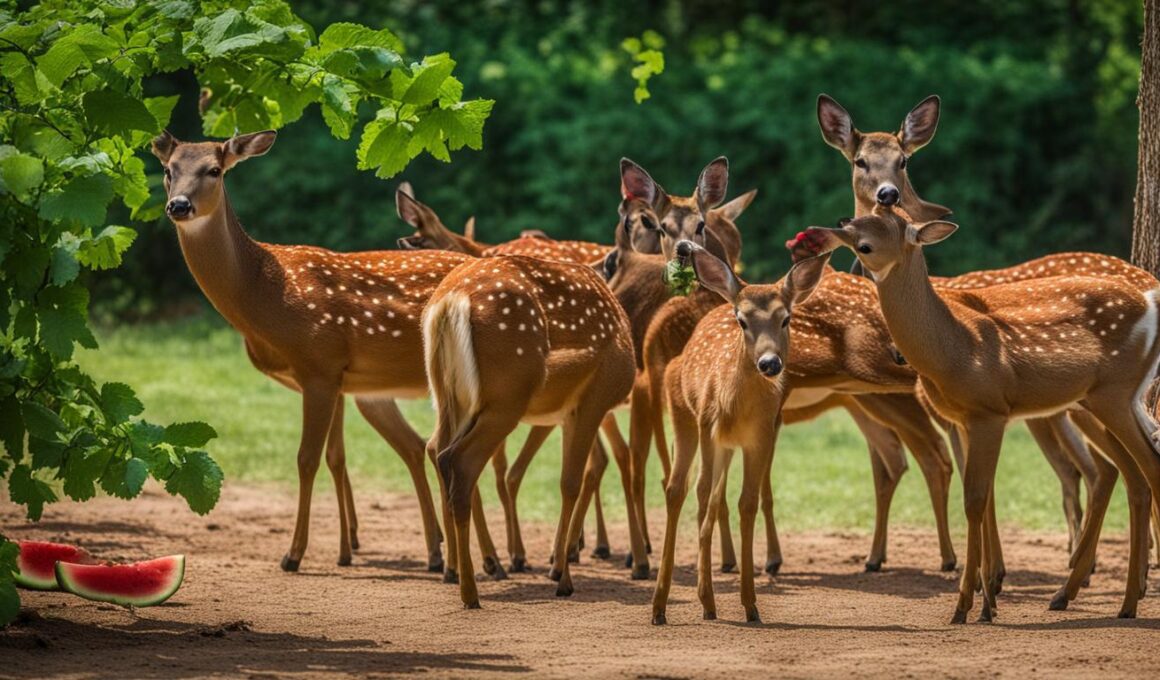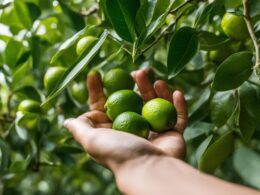Do deer eat watermelon? If you’re a watermelon grower or gardening enthusiast, you may have pondered this question. The answer is yes, deer do eat watermelon. These graceful creatures not only have an affinity for munching on tender greens but also enjoy the sweet taste of this juicy fruit.
Deer can cause significant damage to watermelon crops, particularly when the fruit is ripe and ready for harvest. Their sharp teeth and agile snouts make it easy for them to make holes in the rind and access the delicious flesh inside. This can be frustrating for growers, leading to loss of production and potential financial setbacks.
Fortunately, there are ways to prevent deer from feasting on your watermelons. By implementing effective deterrent methods, you can safeguard your crops and ensure a successful harvest. Let’s explore some strategies to keep deer away from your watermelon plants.
Continue reading to learn more about how to protect your watermelon plants from the hungry mouths of deer.
How to Keep Deer Away from Watermelon Plants
To protect your watermelon plants from deer, you can employ several effective strategies. Follow these watermelon garden safety tips to deer-proof your garden and minimize the chances of your precious watermelon crop being damaged.
1. Install a secure fence: Construct a sturdy fence around your watermelon patch to keep deer out. Make sure the fence is tall enough to deter them from jumping over and has no footholds or good landing spots on the other side. This will help keep deer away from your watermelon plants and prevent them from reaching the delicious fruit.
2. Utilize repellents: Use a combination of different types of repellents to deter deer from approaching your watermelon plants. Deer find certain scents and tastes unappealing, so alternating between repellents such as predator urine, garlic spray, or soap with high odor intensity can help discourage them from coming near your plants.
3. Be mindful of fertilizers: Avoid using nitrogen-based fertilizers in excess, as they can attract deer to your garden. Instead, opt for organic fertilizers that are less appealing to these animals. By controlling the use of fertilizers, you can reduce the likelihood of attracting deer to your watermelon patch.
4. Sidetrack with sacrificial plants: Plant a section of palatable plants, like clover, outside of your garden perimeter to divert deer’s attention away from your watermelon patch. Alternatively, you can also use distasteful plants, such as those with strong scents or prickly textures, to create a natural barrier and discourage deer from venturing further.
5. Use motion-activated deterrents: Install motion-activated sprinklers or noise-making devices near your watermelon plants to startle deer when they approach. The sudden bursts of water or loud sounds can scare them away and prevent damage to your crop.
By implementing these measures, you can significantly reduce the likelihood of deer damaging your watermelon plants. Remember, keeping deer away from your watermelon garden requires a combination of strategies that make your garden unattractive to these grazing animals.
Continue reading to understand the relationship between deer and watermelon in Section 3.
The Relationship Between Deer and Watermelon
Deer are attracted to watermelons because of their sweet taste. While deer generally prefer fruits like apples and persimmons, they have been known to eat watermelon occasionally. The rind of the watermelon may be less appealing to them if it is bitter. However, they may still consume it if it is attached to the sweet fruit.
The leaves and stems of watermelon plants have textures that deer are not fond of, but if faced with food scarcity, deer may still eat them. It is important to note that watermelon plants may not recover fully if they are heavily consumed by deer.
Deer have specific diet preferences, and while watermelon is not their top-choice food, they can still be attracted to its sweetness. The occasional consumption of watermelon by deer can lead to damage in watermelon crops, especially when they target the ripe fruit and create holes in the rind to access the juicy flesh inside. To protect your watermelons from deer, it is important to implement preventive measures such as using fences, repellents, and other deterrents.
Can Deer Digest Watermelon if They can eat Cucumbers?
Can deer eat cucumbers? Interestingly, while deer do eat cucumbers, there is no evidence to suggest that they can digest watermelon. Despite their fondness for cucumbers, watermelon might not be suitable for their diet. So, if you come across a deer, maybe skip the watermelon and offer them some cucumbers instead.
Conclusion
Deer damage to watermelon crops can be a significant problem, but there are steps you can take to prevent it. Installing fences around your watermelon patch can help keep deer out and protect your crops. Additionally, using repellents can deter deer from approaching the area.
Another effective strategy is to plant deer-resistant plants around your watermelon patch. These plants have natural properties that make them unappealing to deer, reducing the likelihood of damage to your watermelon crops. Some examples of deer-resistant plants include lavender, rosemary, and marigolds.
While these measures are not foolproof, they can greatly reduce the chances of deer damage. By implementing a combination of deterrents, such as fences, repellents, and deer-resistant plants, you can increase your chances of harvesting a bountiful crop of sweet and juicy watermelons without interference from deer.









